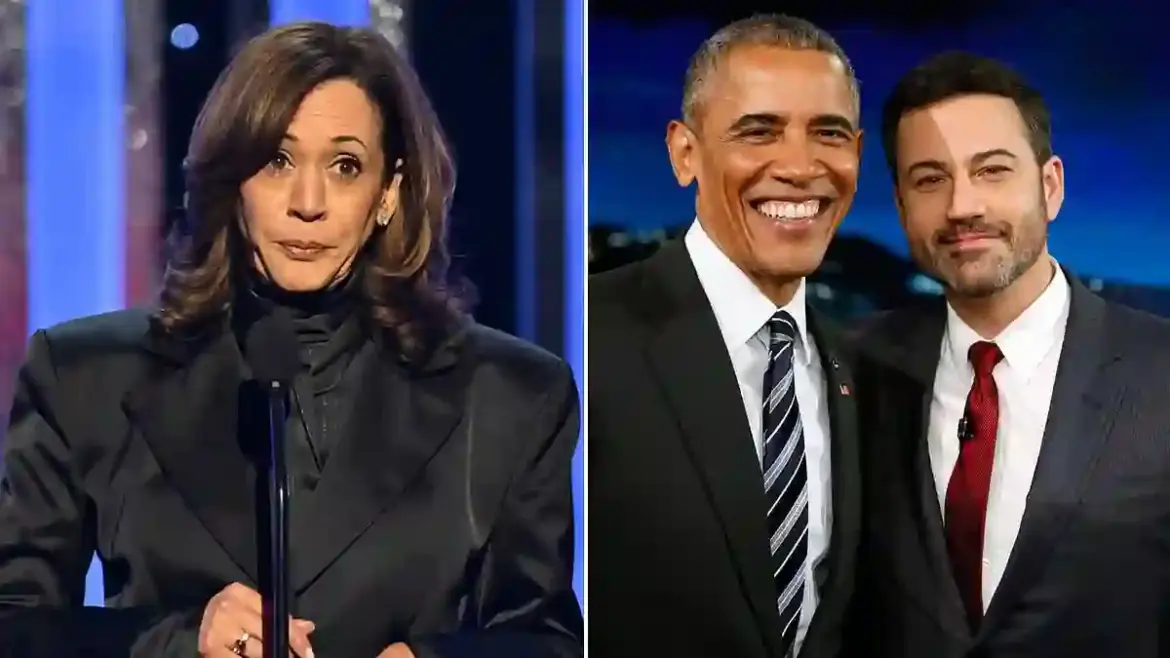What started as another late-night joke quickly turned into a full-blown national controversy.
Jimmy Kimmel’s show was abruptly suspended after he criticized Republicans over their response to the assassination of conservative activist Charlie Kirk.
The decision by ABC—reportedly influenced by pressure from FCC Chairman Brendan Carr—has reopened an old debate about free speech, censorship, and political hypocrisy.
Two of the loudest voices condemning the move? Former President Barack Obama and former Vice President Kamala Harris.
Both slammed the suspension as an attack on democracy, but critics argue they are now on the receiving end of the very tactics they once supported.
Harris Calls It Abuse of Power
Kamala Harris took to social media with a scathing post. “What we are witnessing is an outright abuse of power,” she wrote.
“The administration is attacking critics and using fear as a weapon to silence anyone who would speak out.
Media corporations are capitulating to these threats.
We cannot be silent in the face of this assault on free speech. We, the People, deserve better.”
But her outrage quickly met pushback. Commentators pointed to her own 2019 tweet, in which she demanded Twitter suspend Donald Trump’s account during his presidency.
At the time, she insisted the move was about “corporate responsibility” and “safety.”
That past stance has left many accusing her of hypocrisy now that the shoe is on the other foot.
Obama Joins the Fight Over Free Speech
Obama, usually cautious about weighing into public disputes, didn’t hold back this time.
On BlueSky, he accused the Trump administration of bullying media outlets.
“After years of complaining about cancel culture, the current administration has taken it to a new and dangerous level,” he wrote, “by routinely threatening regulatory action against media companies unless they muzzle or fire commentators it doesn’t like.”
He called it “precisely the kind of government coercion the First Amendment was designed to prevent” and urged networks to resist the pressure.
Obama even shared a New York Times column defending the importance of protecting speech across the political spectrum—from Charlie Kirk to Jimmy Kimmel.
But his critics were quick to note that during his own presidency, his administration was accused of surveilling journalists and cheering the de-platforming of conservative voices.
A Familiar Pattern of Double Standards
The Kimmel controversy underscores a larger cycle in American politics.
Democrats have long wrestled with defending free speech while simultaneously pushing for restrictions on harmful or “dangerous” content.
During the Biden years, the White House was found pressuring social media companies to remove anti-vaccine posts, which conservatives labeled “jawboning.”
Now that Trump is back in office, the script seems flipped.
Conservatives who once railed against “cancel culture” now defend what they call “consequence culture,” while liberals warn that the tools they once wielded are being used against them.
The White House and Its Allies Push Back
The Trump administration dismissed the uproar. Deputy Chief of Staff Taylor Budowich mocked the backlash, writing: “Free speech is alive & well.
Kimmel can head down to Sunset Blvd & maybe even attract a bigger audience than his show did.
Bad jokes & bad TV are bad for biz. ABC is no longer paralyzed in fear by the woke mob. Welcome to Consequence Culture.”
California Governor Gavin Newsom disagreed sharply, accusing Trump of running the country like a dictatorship.
“There is no such thing as free speech under Donald Trump’s reign,” he tweeted.
Yet critics quickly reminded him that just a few years ago, he, Obama, and Harris were far less concerned when Trump and conservative figures were being silenced by Big Tech platforms.
The Monologue That Started It All
The tipping point came during Kimmel’s monologue. He accused Republicans of politicizing Kirk’s murder:
“The MAGA gang is desperately trying to characterize this kid who murdered Charlie Kirk as anything other than one of them, and doing everything they can to score political points from it.”
The remarks triggered outrage on the right and drew a stern warning from FCC Chair Carr about “regulatory consequences.”
Hours later, Kimmel was suspended indefinitely.
Trump and Vance Applaud the Decision
Donald Trump wasted no time celebrating the news.
On Truth Social, he called Kimmel “ZERO talent” and declared it “Great News for America.”
Later, speaking to reporters, he argued the host’s poor ratings and “horrible comments” about Charlie Kirk were reason enough for ABC to act.
Vice President JD Vance went even further, telling Fox News: “If you celebrate Charlie Kirk’s death, you should not be protected from being fired for being a disgusting person.
The First Amendment protects a lot of very ugly speech—but not from consequences.”
A Bigger Question Looms
Kimmel’s suspension is about far more than one late-night host.
It’s reignited an old national question: where is the line between protecting free expression and allowing consequences for speech that offends?
For now, both sides of the political aisle seem to be living with the contradictions of the positions they once held.
